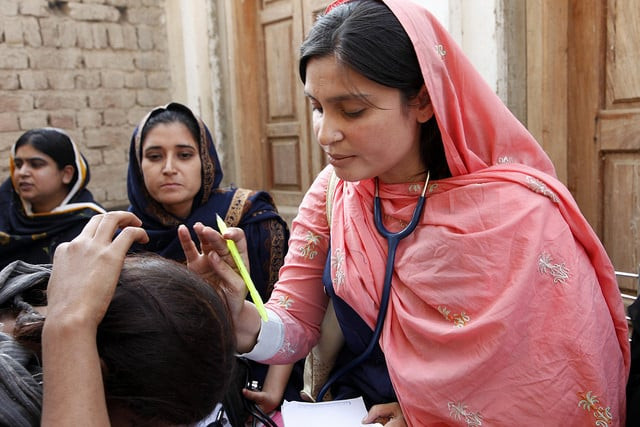It is essential to rephrase the narrative regarding non-practicing female doctors in Pakistan and reconsider how we observe doctors’ employability issues in the region. Loopholes in the healthcare system in Pakistan prevent female doctors from practicing medicine despite the many laws in the Constitution protecting women’s right to employment and equal opportunity.
Like India and Bangladesh, Pakistan is a country where healthcare has a higher ratio of female graduates in the medical and dental fields. It is worrisome, however, that 70% of these graduates cannot practice what they learn in medical schools. Six out of 10 female post-graduates are unemployed in Pakistan, and according to a survey by the Labour Force, “compared to 64% males, only 18% females are employed”. While most people express disappointment when referring to non-practicing women in the healthcare system, it is pertinent to remember that it is not a choice made willingly.
The cultural norms and socioeconomic conditions in Pakistan make it hard for women to access and maintain their education, especially the expensive enrolment process that precedes medical universities. Once enrolled, they must overcome barriers such as conveyance, buying expensive medical supplies such as books, examination equipment, and in my experience, dental materials, to graduate smoothly. Students receive little help and facilitation from parent institutes, especially in the public sector, due to the underfunded healthcare system in Pakistan.
A recent graduate, Dr Nada Ahmed, voiced her concerns, stating,
“I graduated in 2019, and after my house job, I worked in a private clinic where I did an unpaid internship for months. Eventually, they hired me on a meagre wage, but I still had to pay 150 rupees to and from the clinic out of my pocket for conveyance, leaving me with barely anything to spare.”
Unpaid hiring is a real and prevalent problem in the healthcare community, so it is not rare to see doctors protesting in front of press clubs and government institutes.
Government officials and employers often dismiss these protests as a nuisance. They are a familiar but largely ineffective part of every doctor’s career. Dr Wajiha M Ali is a graduate of DOW University and has served at Agha Khan University Hospital (AKUH) as Chief of Residents. It is one of the few hospitals that offer a daycare centre for employees to accommodate working mothers, and they are working at total capacity often with the help of waiting lists. Dr Wajiha says that the child care facility was “one of the main things that attracted her to AKUH”. As a doctor with over 13 years of experience, she has identified an “absence of child care facilities, low wages, and lack of work-life balance as major distress factors amongst working female doctors”.
Medical careers require doctors to continue their studies after completing a bachelor’s degree, which can be very expensive and even impossible for women in Pakistan who wish to marry and start a family.
“Post-graduation programs are costly and often a non-negotiable requirement to secure a promotion. Women who don’t have the privilege of a support system or struggle financially can either excel in their career or raise kids due to lack of an inclusive work environment,” she added.
The human resource department and management is an organisational factor that is entirely missing in Pakistan’s healthcare sector. Dr Wajiha believes that “there is little to no attention to mental health screenings for doctors, and there is an absolute absence of family-friendly human resource policies”. Women might feel more overworked than men in healthcare because house chores and family responsibilities are still gender-based in Pakistan.
“Women have to work long hours with little to no paid leaves or family time in healthcare; financial constraints cause them to avoid marrying, and a poor work-life balance can often result in broken marriages,” added Dr Wajiha.
A narrative review titled Doctor Brides, published in the Journal of Pakistan Medical Association, highlighted that female trainees believed having children would be a barrier to their career progression due to time constraints. “Female doctors also thought that having children would also mean that other people may develop negative perceptions about them,” confirms the paper.
Officials often pinpoint early marriage as the cause behind a decline in working female doctors. In actuality, the reason is much more complex. According to Dr Zeerak Nadeem, a recent graduate with a bachelor’s degree in dental surgery from Karachi Medical and Dental College:
“Career counselling, salaried hiring, childcare facilities, flexible working hours, and supportive mentors are critical to increasing the number of practicing female doctors. We must stop blaming female graduates, who are victims of a severely neglected healthcare system in Pakistan. A career break isn’t always a choice for women; instead, it is necessary because the system has failed them completely.”



COMMENTS
Comments are moderated and generally will be posted if they are on-topic and not abusive.
For more information, please see our Comments FAQ